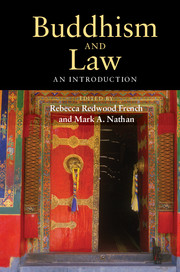Book contents
- Frontmatter
- Dedication
- Contents
- Maps and Illustrations
- Contributors
- Preface
- Abbreviations
- Introducing Buddhism and Law
- Part I The Roots of Buddhism and Law in India
- 1 Society at the Time of the Buddha
- 2 What the Vinayas Can Tell Us about Law
- 3 Keeping the Buddha’s Rules
- 4 Proper Possessions
- 5 On the Legal and Economic Activities of Buddhist Nuns
- Part II Buddhism and Law in South and Southeast Asia
- Part III Buddhism and Law in East Asia
- Part IV Buddhism and Law in North Asia and the Himalayan Region
- A Selection of Readings
- Index
- References
3 - Keeping the Buddha’s Rules
The View from the Sūtra Piṭaka
Published online by Cambridge University Press: 05 August 2014
- Frontmatter
- Dedication
- Contents
- Maps and Illustrations
- Contributors
- Preface
- Abbreviations
- Introducing Buddhism and Law
- Part I The Roots of Buddhism and Law in India
- 1 Society at the Time of the Buddha
- 2 What the Vinayas Can Tell Us about Law
- 3 Keeping the Buddha’s Rules
- 4 Proper Possessions
- 5 On the Legal and Economic Activities of Buddhist Nuns
- Part II Buddhism and Law in South and Southeast Asia
- Part III Buddhism and Law in East Asia
- Part IV Buddhism and Law in North Asia and the Himalayan Region
- A Selection of Readings
- Index
- References
Summary
Early in the history of Buddhist literature, “the word of the Buddha” (buddha-vacana) was arranged in three basic categories: monastic discipline (vinaya), sayings of the Buddha (sūtra), and systematic thought (abhidharma), giving us the traditional “three baskets” (tripiṭaka).
The “sayings” or “discourses” (sūtra) that make up the Sūtra Piṭaka characteristically begin with the phrase: “This is what I have heard. The Lord was once staying at […]” Some circumstance is then introduced which becomes the occasion for (usually) the Buddha to give some teaching, often in the form of a dialogue. The texts of the Sūtra Piṭaka comprise four principal collections (nikāya/āgama): Long (dīrgha) Sayings, Medium-Length (madhyama) Sayings, and two collections of shorter sayings, Grouped (saṃyukta) and Numbered Sayings (ekottara). A number of other miscellaneous (kṣudraka) texts are also usually classified as belonging to the Sūtra Piṭaka.
Our knowledge of the Sūtra Pītaka is less complete than in the case of the Vinaya Pitaka, versions of which belonging to six ancient Indian schools have come down to us. One version of the Sūtra Pītaka, from the Theravāda school, survives complete in the ancient Indian language of Pāli. Parts of the versions of two other ancient schools, the Dharmaguptaka and Sarvāstivāda, survive variously in Sanskrit, Gāndhārī, and in Chinese and Tibetan translations. The differences between the versions usually concern matters of detail rather than substance.
- Type
- Chapter
- Information
- Buddhism and LawAn Introduction, pp. 63 - 77Publisher: Cambridge University PressPrint publication year: 2014
References
- 3
- Cited by



